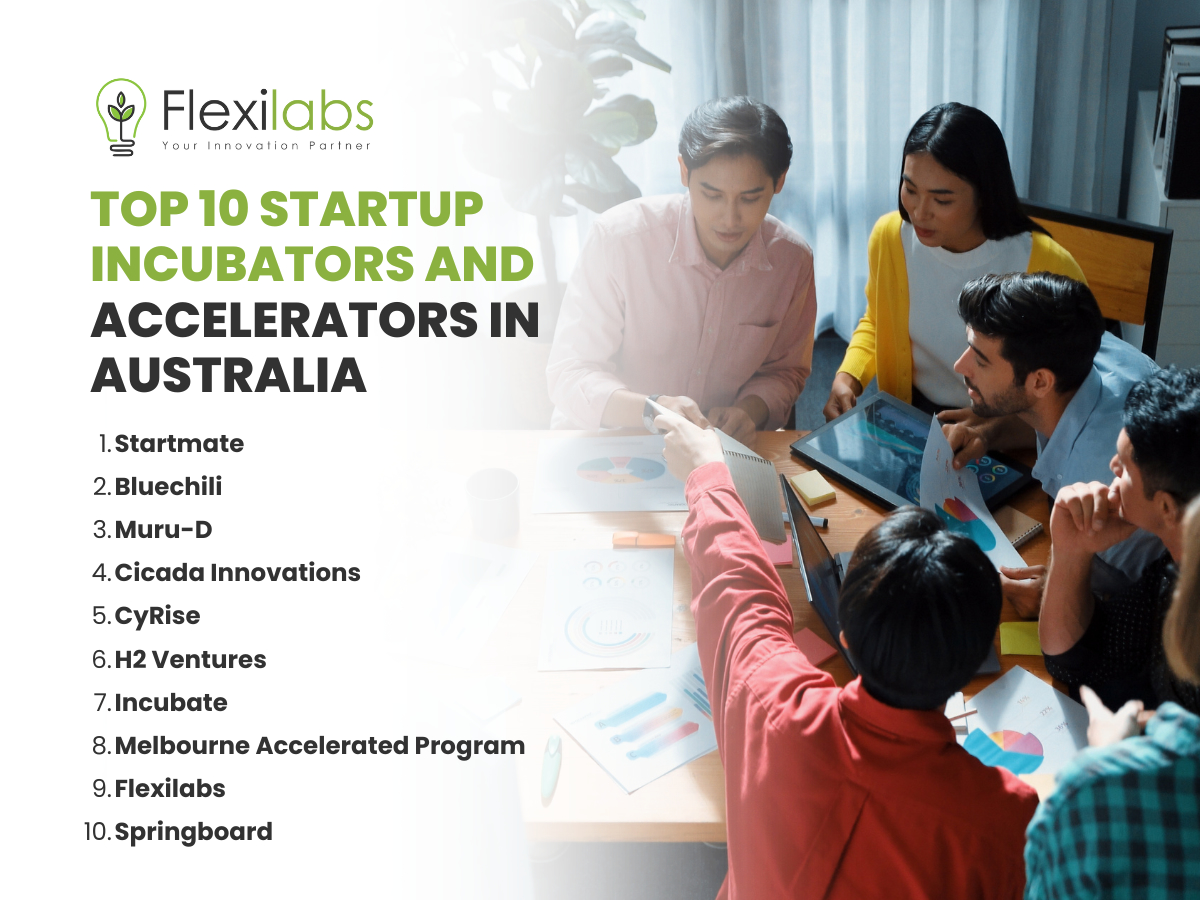Knowing what startup incubators in Australia are and their difference from accelerators is a key ingredient in a successful startup business. The rise of financial independence continues to grow in Australia, and very few know where to begin or what to do. Incubators and accelerators are just some of the many terms and processes that aspiring business owners fail to understand.
However, once you learn the difference between incubators and accelerators as well as their beneficial uses, you will find yourself in a more comfortable position than before. Expanding your business may require a lot of ambition, but it also needs knowledge.
What are Startup Incubators?
Startup incubators are an important part of a startup company’s journey. Startup incubators help promising startups and mold them for better performances compared to their initial creation. A startup incubator can be found locally or outsourced.
A startup incubator is a partner that helps your business by providing resources, generating improvements, consultation on legal documents, a shared workspace, and mentorship. Some startup incubators go above and beyond by even providing funding for a startup company. Take note that many startup incubators still do not provide funding.
Organisations (whether public or private) are usually the ones leading startup incubators. They host programs for business owners to develop.
Take note that a startup incubator does not last permanently. Most of the time, startup incubators last a maximum of one year and a minimum of a few months.
What are Startup Accelerators?
Startup accelerators may look similar to incubators. However, they have key differences that make them worlds apart. For starters, startup accelerators are very generous in terms of scaling a business. From education to resources, startup accelerators have more detailed tasks and offer more programs to venture forward.
This means accelerators provide a large jump ahead by training and enhancing years of professional experience into a compilation that spans within just months. Meanwhile, startup incubators prioritise perfecting an idea.
Startup accelerators are big investors in your company. They fund your business to its peak potential in return for some stakes within your company itself. Included in their involvement are connections to other investors, alumni, and industry leader mentorships.
Startup Incubators vs Accelerators
Startup incubators and accelerators are completely different, and now you know. But which one suits your startup business? Learning about them is one thing, but learning which ones they cater to is another.
Top 10 Startup Incubators and Accelerators in Australia
There are many types of business incubators and accelerators in Australia. Some are more lenient than others. Here’s a recommended list of a few that you may wish to consider.

Startmate
Partnering with Startmate is a top option when your business involves tech-related services or products. Their hub is in Melbourne, Australia, where they offer a co-working space and organise trips. Startmate is a great option on the list of startup incubators and accelerators also for their unique take on mentorship.
Startmate has coaches and content sessions for 12 weeks. The startup businesses that receive partnerships with Startmate are given mentors that invest their own money in the startup they’re taking care of.
Bluechilli
Bluechilli assists like other startup incubators or accelerators for businesses with strong founders. The company focuses on early tech startup companies and even invests as an accelerator financially or raises its partners’ capital.
Bluechilli has a wide range of programs catering to different groups of people. The three most notable are She Starts, HealthTech, and Future Minds. These three cater to specific targets in the startup tech industry. An example would be that She Starts caters to women-led startups in the tech industry.
What is interesting about Bluechilli is that it prioritises health-related startups focused on innovation within the health sector of Southeast Asia. Hence, the HealthTech program.
Muru-D
Muru-D can be an exciting partner for those looking for startup incubators and accelerators. It’s backed by Telstra and has over 300 active alumni. Their target market? Businesses are looking for global solutions with the help of tech-enabled companies.
Intensive courses with mentorship and networking with investors as well as alumni are what Muru-D offers. You can find them in three large cities in Australia: Perth, Sydney, and Brisbane.
Cicada Innovations
Agriculture, medicine, and technology are the three main businesses that Cicada Innovations participates in. The company is owned by four well-known Australian universities: the University of South Wales, the University of Sydney, the University of Technology Sydney, and the Australian National University.
Startup incubators like Cicada Innovations prioritise agriculture and healthcare-related businesses. They go so far as even to give their partners access to prototyping labs for usage. Cicada Innovations’ healthcare and agriculture programs are Growlab and Medlab.
They’re also well known in the startup incubators business. The International Business Innovation Association named them Top Incubator of the World twice.
CyRise
CyRise is one of the more super-specific partners on this list of startup incubators and accelerators. Cyber Security is CyRise’s sole priority and encourages the growth of its services globally.
CyRise looks out for cyber security businesses in the Asia-Pacific region. Specifically, ones that have innovative ideas and direct solutions. The program they have lasts 14 weeks and provides access to funding and Deakin University researchers.
H2 Ventures
H2 Ventures, a 2013 partnership created by Ben and Toby Heap, is one of the startup incubators and accelerators that invest in three subtypes of technology. Data, AI, and financial technology are their main interests.
H2 Ventures is a 20-week program with mentorship, workshops, and a chance to impress potential investors with showcase opportunities.
Incubate
The University of Sydney students back in 2012 came up with one of the most impressive student-born startup incubators Australia has seen. The goal was to help their fellow students start their businesses.
They specifically search for students with ambitions and a startup. Because of their dedication and entrepreneurial programs, 135 companies have elevated themselves to a jumpstart with the help of an estimated 100 mentors.
The award-winning Incubate offers 14 weeks of accelerator programs, including workshops and events, equity seed funding, co-working spaces, and mentorship. Access to the Incubate program is limited, with only 15 students chosen for the program in a year.
Melbourne Accelerated Program
Aside from startup incubators for students, 2012 was also the year that the Melbourne Accelerator Program (MAP) was born. Along with the University of Melbourne, MAP created a five-month-long program for young business owners with tech-related services. Not only that, but the startup itself requires a large impact on the industry.
You can only apply for the MAP if you have connections with the University of Melbourne or if the social part of your startup is similar to the University of Melbourne.
Flexilabs
Flexilabs, the forefront of hybrid outsourcing, is an excellent choice as both incubator or an accelerator. The company focuses only on Australian businesses but has a team of world-class mentors, developers, and designers. The goal of Flexilabs is to identify potential blockers and potential markets on which your business can expand.
Their program lasts seven weeks and includes feasibility assessments, POC validations, and the creation of prototypes to jumpstart your business.
Springboard
Springboard is rare for startup incubators and accelerators because of its goal of empowering female business owners. The goal is to aid women with innovative ideas and develop business models.
This means that if there is no woman in a senior management position with an equity stake in the company, the startup itself is disqualified. However, suppose a startup business does pass their requirements. In that case, they will be given a program worth four months with a two or three-day boot camp where they can meet talented and experienced women leaders, thus giving access to domain experts and potential investors.
How to Choose the Perfect Incubator or Accelerator for Your Startup?
There are many key factors when choosing the right startup incubator or accelerator. However, it all comes down to two things: whether you meet their requirements and the state of your company currently.
Startup incubators prefer to mold and advise their partners on the right path. Meanwhile, accelerators focus on expanding a business to its full potential within a short-term period. You must also take note of the type of business you are working on. Some startup incubators or accelerators only invest in one particular kind of business, while others have a wide variety.
Why Do You Need an Incubator or Accelerator?
Now that you know about the benefits that both startup incubators and accelerators provide, the next question is finding out which one suits you. Accelerators vs incubators is a big debate since their differences are often overlooked. Be mindful of the key ingredients that both provide before choosing the best option for your startup business.

